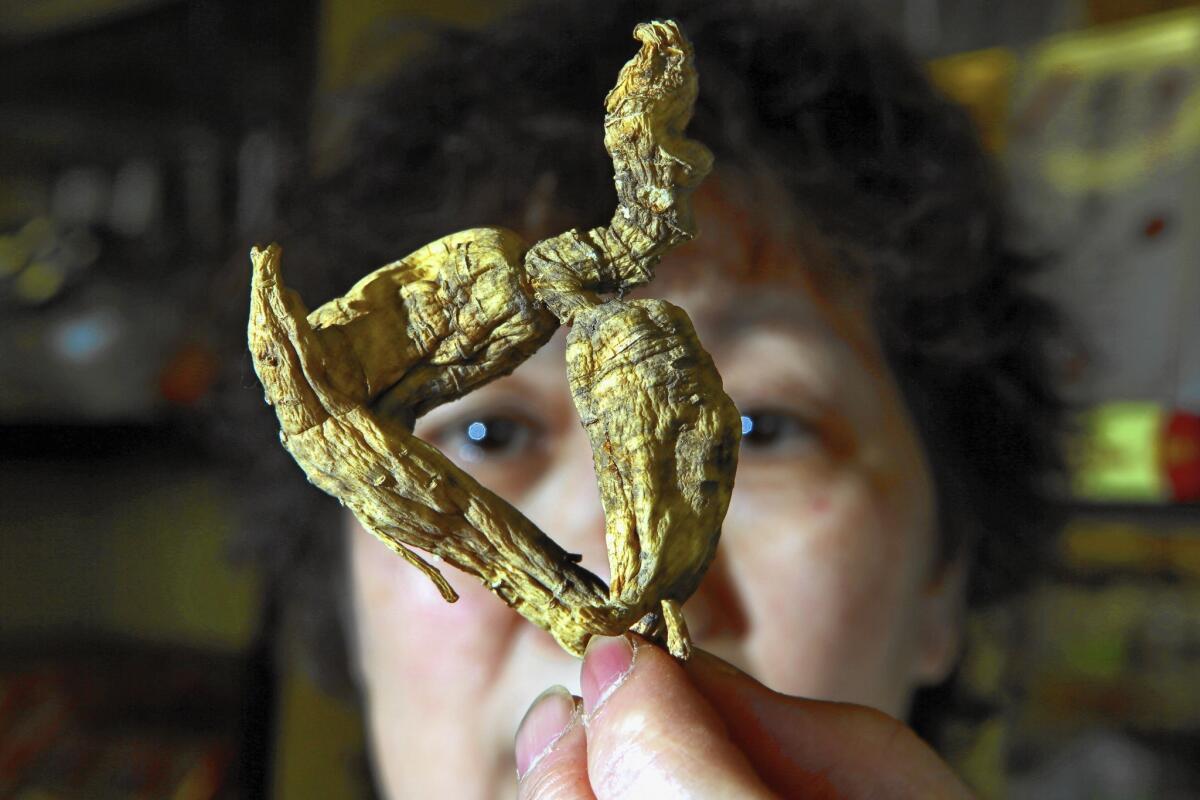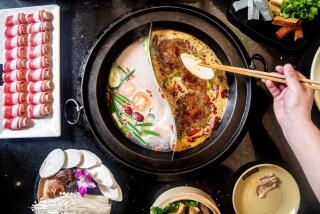American ginseng has a loyal Chinese clientele

- Share via
One of the most popular holiday gifts in China is ginseng, stamped with an unusual guarantee: 100% American.
Few consumers are more faithful to American products than Chinese users of ginseng: the U.S. exported $77.3 million in ginseng roots last year, most of it to Hong Kong, and American ginseng fetches the highest price of any cultivated variety.
The Asian market prizes the American strain for its stronger flavor and high levels of the active ingredient that is said to unlock the root’s myriad but unproven health benefits.
The other part of the U.S.’ competitive advantage is favorable feng shui. Ginseng grown in North America is said to have a “cool” nature and calming effect, which means it can be taken daily; Asian ginseng is considered “hot” and must be consumed in limited quantities.
American ginseng is cheaper in the U.S. than in China. In the San Gabriel Valley, herbal stores cluster on streets near hotels popular with tourists, their shelves loaded with red boxes covered in quality seals and branded with American flags.
But an American flag is no guarantee of American authenticity, said Tom Hack, international marketing director for the Ginseng Board of Wisconsin, where he says up 95% of the U.S. crop is grown.
In a recent survey at an Asian food expo in Southern California, the board found that less than 12% of ginseng products labeled as Wisconsin ginseng actually came from Wisconsin.
Hack says American ginseng purchased in America is more likely to be Canadian, or....
Chances are, he said, the Chinese tourists “are taking Chinese-raised ‘American ginseng’ back with them.”
::
At Chung Chou City in San Gabriel, the heavy scent of dried herbs and seafood fills the air as an elderly customer sinks his hand into a barrel of sliced ginseng root. Manager Jeff Lin hurries over.
“Man man kan,” he says encouragingly. Take your time.
Ginseng is a boom-or-bust business, Lin said; sales jump when plane tickets are cheap and tourists from the Hilton hotel across the street are plentiful. Lin has noticed a slight increase before breaks in the school year, when Chinese students studying in the U.S. buy boxes to take home to their families. Ginseng is an especially prestigious gift to give for Christmas, Lin said.
Raw ginseng is available in several 60-pound barrels at the front of the store, but Chung Chou City also offers ginseng whole, chopped, powdered, in pills, or as candy or tea. Thick roots are more valuable, and smooth, unblemished roots cost hundreds of dollars more. Wild, foraged ginseng commands the highest price, but American-grown ginseng is the most popular, Lin said.
Stores eagerly display their Wisconsin credentials. At Ten Ren Tea and Ginseng in Monterey Park, a gold-plated plaque with the words “Wisconsin Ginseng Export License” hangs over the counter. Other stores offer glossy pamphlets describing company-owned-and-operated ginseng farms in Wisconsin.
It’s a highly profitable industry in which even a few small sales can put a store in the black. At one store, the most expensive roots were selling for up to $9,000 a pound.
The lucrative root even spurred a 2012 crime spree in Monterey Park.
The thief would sprint into a store, seize a container of ginseng or sea cucumber and then jump into a waiting black Honda. (The thief and his driver were arrested by Monterey Park police a month later.)
::
Around this time in late February, in the days after the Lunar New Year, Wisconsin’s ginseng farmers are overrun with orders from Chinese suppliers trying to restock after the holiday rush.
Sales have been strong the last few years, and farmers have sold out their whole inventory, said Hack of the Ginseng Board of Wisconsin. In 2013, the board and Beijing-based Tong Ren Tang signed a 10-year, $200-million deal to sell Wisconsin ginseng in China.
But over the last two decades, Wisconsin farmers have watched their market share sharply decline thanks to ginseng piracy and brand dilution, Hack said.
As proof, he offers some math. Wisconsin produces about 700,000 pounds of ginseng a year — 95% of the American crop, according to the Ginseng Board. About 80% of that is exported directly to Asia. That leaves roughly 140,000 pounds of genuine Wisconsin ginseng for distribution in the U.S. — a small fraction of U.S. sales.
U.S. ginseng suppliers typically aren’t selling Wisconsin-grown ginseng, Hack said, because so little of it is available in the domestic market. The U.S. imports a lot of ginseng for domestic use — about $31.3 million of it in 2014, according to WiserTrade, an research firm that compiles data on U.S. foreign trade.
Some of that imported ginseng could be marketed as Wisconsin-grown, Hack said. A few years ago, Wisconsin ginseng seeds were planted in Canada and China — both among the world’s leading ginseng producers.
Funded by assessments from ginseng farmers, Wisconsin’s Ginseng Board was formed in 1986. In 1991, it trademarked an official seal that would be stamped only on board-verified ginseng products.
But the seal was widely pirated, and the board sued several companies for trademark infringement.
Today, just seven distributors worldwide are authorized to use the seal. But ginseng suppliers are still counterfeiting American authenticity, Hack said.
In January, Wisconsin Ginseng Board officials flew to Southern California and inspected dozens of Wisconsin-branded ginseng products at the Asian American Expo in Pomona. Hack says less than 12% of the products were actually from Wisconsin.
Hayward-based Prince of Peace is one of just two authorized distributors of Wisconsin ginseng in the U.S. The company distributes about 80,000 pounds of the product a year, said Billy Poon, general manager of its Asian market division.
They package their ginseng in distinctive peach-colored boxes printed with an endorsement from former pro tennis player Michael Chang. But even their packaging has been pirated, Poon said.
Hack declined to comment on whether any lawsuits were pending against Southern California companies, saying only that cease-and-desist letters had been sent based on their findings at the Pomona event.
Wisconsin’s ginseng industry has shrunk dramatically thanks to plummeting prices, Hack said. At one point, there were 1,500 growers producing 2.2 million pounds of ginseng a year. Today, about 180 growers produce about 700,000 pounds annually.
“We don’t get a fair shake,” said Joe Heil, a Wisconsin farmer who has cultivated ginseng for 22 years. Imported ginseng “is mislabeled, it’s snuck in. The Chinese [who] are bringing it in laugh about it.”
On Garvey Avenue in Monterey Park, Joe Lin, owner of Chang Le Xin Hui Group, munches on Hainan chicken as he oversees an empty store.
An immigrant from China’s Fuzhou province, Lin opened three years ago, and his business has grown slowly. Competition is fierce; within a few blocks of his store, about a dozen others compete for tourist business from the nearby Lincoln Plaza hotel.
Down the street, a box of American-labeled ginseng was going for $10. At the Yuen Fong Sum Yong Trading store in neighboring San Gabriel, the deal was buy one box, get one free.
“There are too many ginseng stores,” Lin said. “We Chinese people always do this — as soon as something makes money, everyone copies it.”
More to Read
Sign up for Essential California
The most important California stories and recommendations in your inbox every morning.
You may occasionally receive promotional content from the Los Angeles Times.








